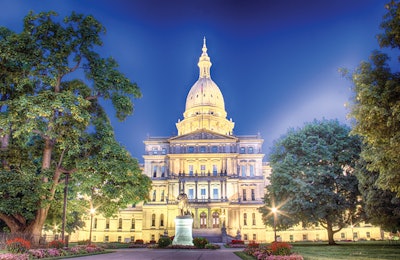
The Michigan Medical Marihuana Act (MMMA) — a 2008 citizens’ initiative sponsored by the Marijuana Policy Project — passed easily in November that year, with 73 percent voting in support of the ballot proposal. It also passed in every one of Michigan’s 83 counties. The law took effect April 1, 2009, and the first cards were issued April 20, 2009.
Now, almost seven years into the program, a State of Michigan report issued in January indicates that there are 182,091 patients and 34,269 caregivers in the state. According to another report, Michigan ranks fourth in per-capita registered patient numbers, behind only Colorado, California and Oregon.
The system allows patients to grow 12 plants or may assign those growing rights to a caregiver through the state registration process. A caregiver may have no more than five patients (in addition to themselves, if they also are a patient).
Accordingly, maximum garden size in Michigan is limited to 72 plants, and the patient or caregiver who has the growing rights is the only person allowed to access the garden. Collectives and cooperatives are currently not allowed under Michigan law.
The program was in its heyday in 2011, with dispensaries locating throughout the state. (The state capital, Lansing, had around 80 dispensaries open at one time.)
Then, in 2012, the Michigan Supreme Court weighed in on Section 4 of the MMMA, holding that the law is asymmetrical — protecting the patient’s acquisition of cannabis from whatever source they choose, but also holding that the “transferor” is protected only if they are the registered caregiver for that patient, connected through the state registry (which is confidential). The court further held that any such transfer is protected only if the transfer is being made for that patient’s own use. So, in other words, unless you’re a registered caregiver or a particular patient, you can’t sell or “transfer” medical marijuana to anyone.
In spite of the fact that a number of cities have licensed dispensaries, those city-legal dispensaries are not sanctioned under state law. Every transfer to a dispensary can be considered a felony under Michigan law, and every transfer from a dispensary also can be considered a felony under Michigan law. The law prohibits transfer, not just sale, and so the facilities that boldly declare, “We only take donations,” or “We only sell to people who have medical marijuana cards,” are making unwise statements that may be used against them in court.
There is an argument that, while such transfers still would be considered crimes under the law, there may be a defense to criminal charges for such acts under Section 8 of the MMMA — the affirmative defense section. That issue is now undergoing appellate review in two cases from Kent County, Mich., where the City of Grand Rapids is located.
We expect the very conservative Michigan Court of Appeals to deny relief in those two consolidated cases, but hope that the Michigan Supreme Court then will review the matters.
In our dreams, those of us who have been incredulous at the linguistic gymnastics engaged in by the Supreme Court — to find that the law is asymmetrical (protecting patients, but not “transferrers”/providers) — foresee the court eventually overturning that decision, which appears to be without legal precedent.
In spite of the fact that a number of cities have licensed dispensaries, those city-legal dispensaries are not sanctioned under state law.
Four years after the Michigan Supreme Court’s decision, many new dispensaries have opened, and there are more in the state now than ever. Those cities with dispensary ordinances continue to license entities that meeting zoning and licensing requirements.
There has been legislative rumbling for years regarding licensing of commercial establishments.
One set of bills strongly supported by the cannabis community died at the end of 2014, with the final and fatal strokes being intensive lobbying by the law enforcement community against the bills. (Someone needs to remind the powerful law enforcement community that their job is to enforce policy, not to create it.) Cops have a huge conflict of interest in this discussion because they profit from policing (especially in civil forfeiture matters, where Michigan ranks close to the bottom in forfeiture fairness).
New Bills Being Considered
A package of three bills is now on the docket of the Michigan Senate, having passed in the House of Representatives late in 2015. The Michigan legislature sits in two-year sessions, so any bills not passing before the end of 2016 will die. The bills — HB 4210, HB 4209 and HB 4827 — can be viewed online at MichiganLegislature.org.
HB 4210 would legalize extracts and edibles, which were held to be illegal by the Michigan Court of Appeals, due to poor drafting of the 2008 initiative — which allowed only plants (12 in number), and dried leaves and flowers (2.5 ounces), but failed to incorporate other existing terms in the criminal law, specifically resin, which still is outlawed.
HB 4209, which aims to establish a licensing and regulatory framework for medical marijuana provisioning centers and other facilities, would set up a state board of five members appointed by the governor, which would approve any licenses, but only after a positive recommendation from the local community where the facility would be located.
Caregivers would have to give up their care-giving rights if they work in the commercial cannabis industry, with HB 4209 setting up seven different licenses. The bill provides for:
- three tiers of licenses — for gardens of up to 500, 1,000, or 1,500 plants,
- a processing license to make oils, edibles, extracts and topical preparations,
- a license for safety compliance facilities (testing labs for determining purity and potency),
- a secure transporter license, and
- a retail license (calling them provisioning centers).
HB 4827 requires seed-to-sale tracking, where every gram of cannabis is accounted for at each stage of the process.
These three bills are stuck in the five-member Senate Judiciary Committee, which likely does not have the votes to move the bills out of committee. There was a recent legislative move for the Senate to pull the bills back from the committee, but so far, that has not gone anywhere.
Many pundits are skeptical that the Republican-dominated legislature in Michigan will move anything at all, much less anything acceptable to most of the medical marijuana community in the state.

A Progressive Recreational Effort Underway
In January 2015, representatives of a group called the Michigan Responsibility Council (MRC) contacted Michigan NORML (MINORML), offering to help MINORML in the fight for legalization of recreational marijuana. MINORML was intrigued, but refused the group’s assistance after the MRC confided that their plan was to model Responsible Ohio, the 2015 ballot proposal in Ohio, which would have established an oligopoly of 10 large growers, who would provide all the cannabis for sale in the state (under what would have been a legal and regulated recreational cannabis market).
Responsible Ohio was soundly defeated in November 2015.
After refusing the overtures of the MRC, activists in Michigan formed the Michigan
Comprehensive Cannabis Law Reform Initiative Committee, which has adopted the moniker MILegalize, with a website address of www.MiLegalize.com. The committee is comprised of 15 activists and led by Lansing attorney Jeffrey Hank. Three MINORML Board Members are on the MILegalize committee, and MINORML has endorsed MILegalize.
Two other legalization initiative groups have had petition language and format approved by the Michigan Board of Canvassers, but most experts agree that MILegalize is the only marijuana initiative likely to make the ballot in Michigan in 2016.
The MILegalize proposal avoids setting up any state agency with authority to regulate the program, based on past experience with the reluctance of the state government to further the will of the citizenry. MILegalize would allow any city, township, village or Native American Indian tribe to entirely ban cannabis businesses or pass ordinances licensing any type or size of cannabis business.
Those captains of the cannabis industry who are interested in broadening their continental reach should not overlook this historic opportunity to support what would be the most liberal marijuana legalization law in the United States.
The proposal removes criminal penalties for any violation except for transferring cannabis to minors, or driving under the influence. It protects medical patients (who have been prosecuted far too frequently), allows for production of industrial hemp and legalizes recreational marijuana use for adults.
The population of Michigan is approximately twice that of Colorado, and Michigan is surrounded by the greatest concentration of fresh water anywhere in the world (making the Flint water debacle even more bizarre).
If MILegalize makes the ballot (the filing deadline is June 1), it will be the first statewide marijuana initiative in the United States not backed by one of the traditional major funders (Marijuana Policy Project (MPP) or Drug Policy Alliance). The petition drive needs 254,000 valid signatures of people registered to vote in Michigan. At the beginning of this year, MILegalize reported that it had already collected more than 200,000 raw (unverified) signatures using both volunteer and professional signature gatherers.
Money is continuing to be raised to finish the signature collection phase of the drive and then to support the campaign that will follow. Much of the money has been raised with the support of one angel donor who has contributed matching funds of well over $200,000, but more money is needed to assure a place on the ballot.
Activists are confident the proposal will pass, as voters in Michigan are supportive of legalization. Nearly 56 percent of Michigan voters supported legalization efforts, while 40 percent were against legal marijuana, a Michigan Public Radio Poll found in September 2015.
Those captains of the cannabis industry who are interested in broadening their continental reach should not overlook this historic opportunity to support what would be the most liberal marijuana legalization law in the United States. The MPP plan is to wait for 2020, when their newer proposal hopefully would be more functional than the current MMMA. But the world cannot wait. Visit MILegalize.com now, and let’s do this!
About the Author: Matthew Abel has been a lawyer in Michigan for 30 years, and is executive director of Michigan NORML. He founded Cannabis Counsel, P.L.C., a five-attorney Detroit, Mich., law firm entirely devoted to cannabis clients and cases. He currently is serving on the Board of Directors of MILegalize. His legal work mainly involves legal counseling and licensing for the Michigan cannabis industry. Abel is a lifetime member of the NORML Legal Committee and the National Association of Criminal Defense Lawyers, a member of the National Lawyers Guild, and serves on the legal committee of the ACLU of Michigan. He has lectured extensively to both lawyers and non-lawyers inside and outside of Michigan.
















